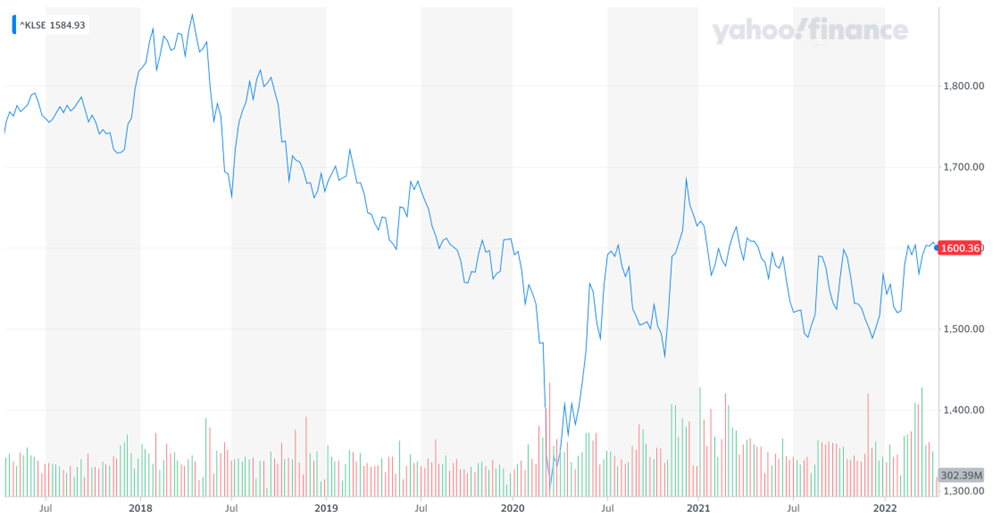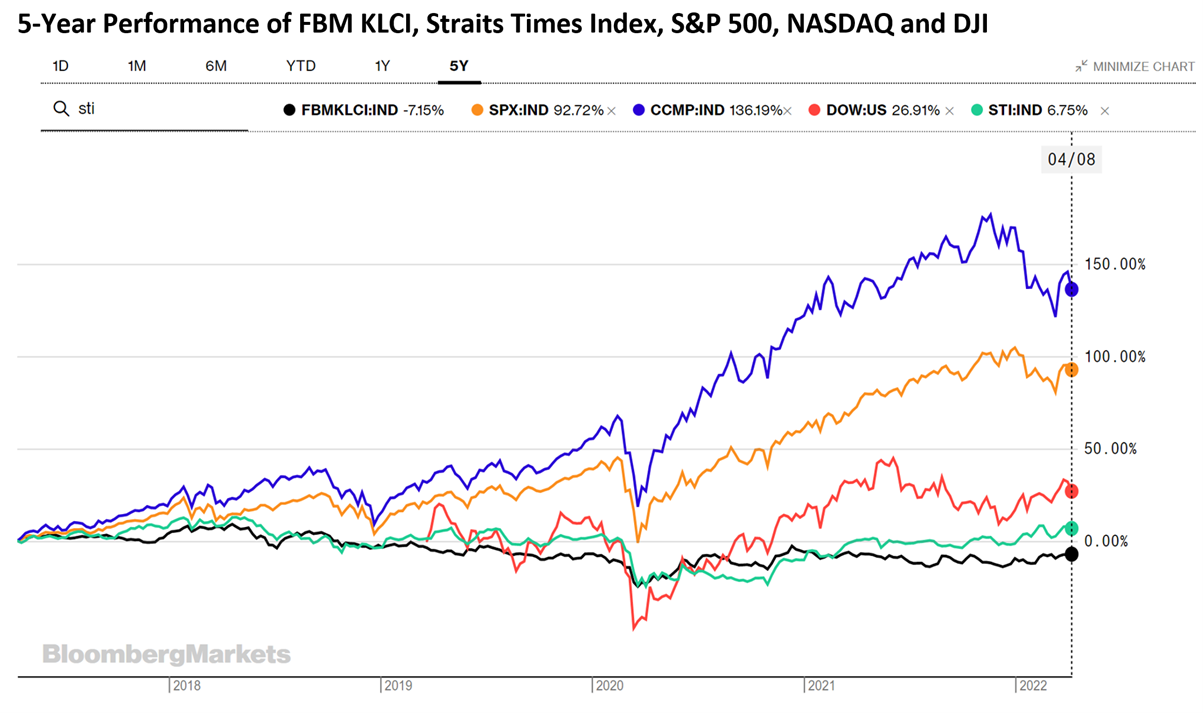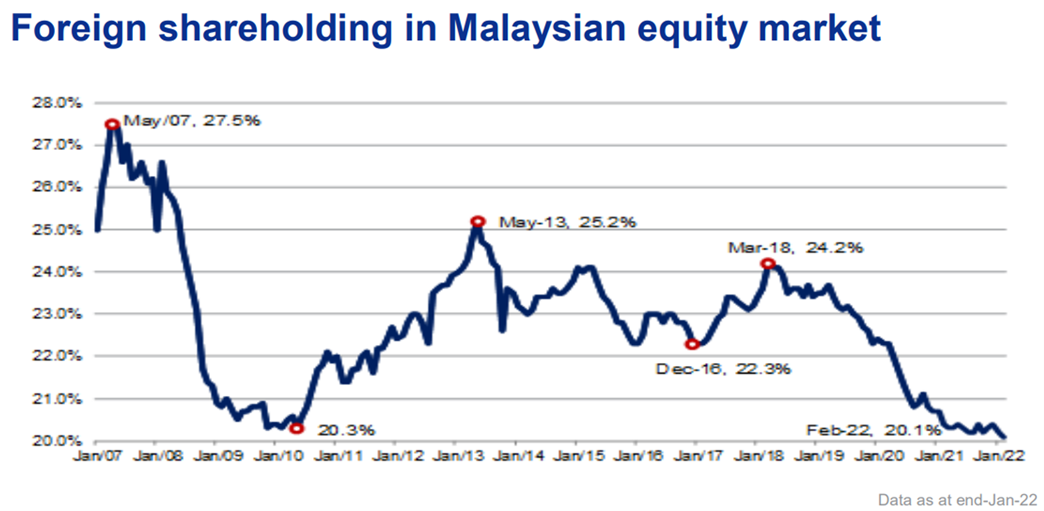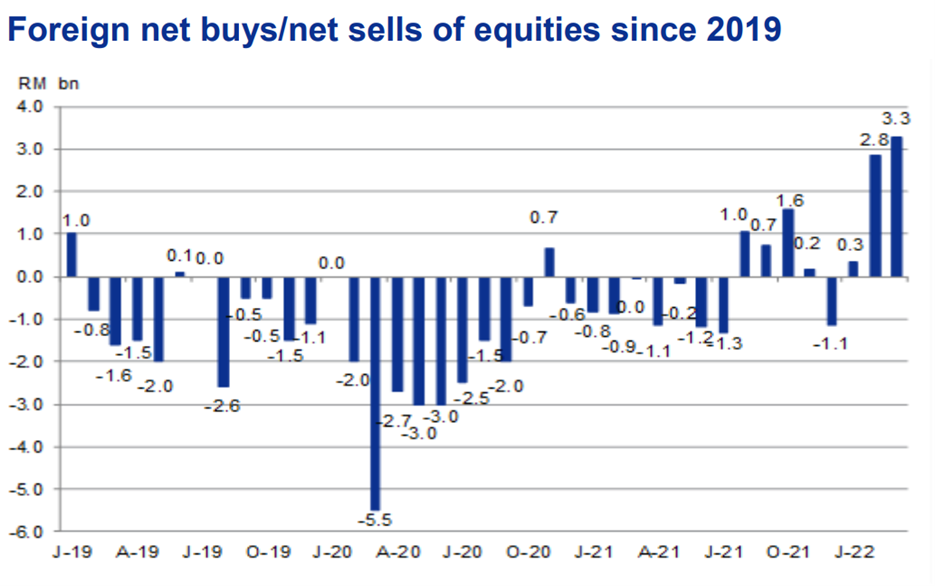As investors can see below, the Malaysian stock market has been struggling over the last five years (see chart below).
 Source: Yahoo! Finance, ProsperUs
Source: Yahoo! Finance, ProsperUs
The FTSE Bursa Malaysia KLCI, also known as the FBM KLCI index – which is a capitalisation-weighted stock market index composed of the 30 largest companies on the Bursa Malaysia Stock Exchange – has dropped from the 1,887.75 level back in 2018 to its closing of 1,597.13 on Tuesday (12 April 2022).
Over the last five years, the FBM KLCI saw a decline of 7.2%. In comparison, Singapore’s Straits Times Index was up by 6.8%.
Meanwhile, US stock market indices such as the S&P 500 Index, NASDAQ Composite Index and Dow Jones Industrial Average saw an increase of 92.7%, 136.2% and 26.9% respectively (see below).
 Source: Bloomberg, ProsperUs
Source: Bloomberg, ProsperUs
Why has Malaysia’s stock market been falling?
The last five years have been a challenging environment to invest in the Malaysian stock market amid the pandemic, changes in the political landscape as well as the concern over corporate governance in the country as the 1MDB financial scandal unfolded.
It is hard to gauge if foreign investors are more concerned over the political uncertainty in Malaysia or the 1MDB saga that involves Goldman Sachs.
Regardless, foreign shareholdings in Malaysian stocks was down to only around 20% (see chart below).
 Source: CGS-CIMB, Bursa Malaysia
Source: CGS-CIMB, Bursa Malaysia
Signs of recovery in Malaysian stocks
The recovery in the Malaysian stock market is seen with the return of foreign investors. In March 2022, foreign investors were the largest net buyers in the Malaysian stock market, to the tune of RM 3.3 billion (US$780 million)..
This is also the third consecutive month of net buying into the Malaysian stock market by foreign investors.
It’s a good start for Malaysia after four years of consecutive net selling by foreign investors in the Malaysian stock market since Malaysia’s 14th General Election back in 2018.
 Source: CGS-CIMB, Bursa Malaysia
Source: CGS-CIMB, Bursa Malaysia
Malaysia’s recovery lags in the region
Despite the return of foreign investors, the Malaysian stock market lagged behind its peers, such as Singapore, Indonesia and Thailand.
In the first quarter of this year (1Q 2022), Singapore’s Strait Times Index (STI) was the best performer with a gain of 9.1%, followed by Indonesia’s Jakarta Composite Index (JCI) and Thailand’s Stock Exchange of Thailand (SET).
Finally, the FBM KLCI was the weakest gainer with a +1.3% gain during the 1Q 2022.
Time to invest in the Malaysian stock market
While the negative sentiment over the last five years has dragged Malaysia’s stock market into a decline, there are various potential positives in the country.
A good example is the semiconductor industry.
In fact, Malaysia is one of the key semiconductor hubs in the region. Intel Corp will invest more than US$7 billion to build a new chip-packaging and testing factory in Malaysia.
The new advanced packaging facility in Malaysia is expected to begin production in 2024.
It would be impossible to time the entry into the Malaysian stock market but signs are pointing towards a recovery and foreign investors are gradually returning.
Disclaimer: ProsperUs Investment Coach Billy Toh doesn’t own shares of any companies mentioned.



 Source: Yahoo! Finance, ProsperUs
Source: Yahoo! Finance, ProsperUs Source: Bloomberg, ProsperUs
Source: Bloomberg, ProsperUs Source: CGS-CIMB, Bursa Malaysia
Source: CGS-CIMB, Bursa Malaysia Source: CGS-CIMB, Bursa Malaysia
Source: CGS-CIMB, Bursa Malaysia





